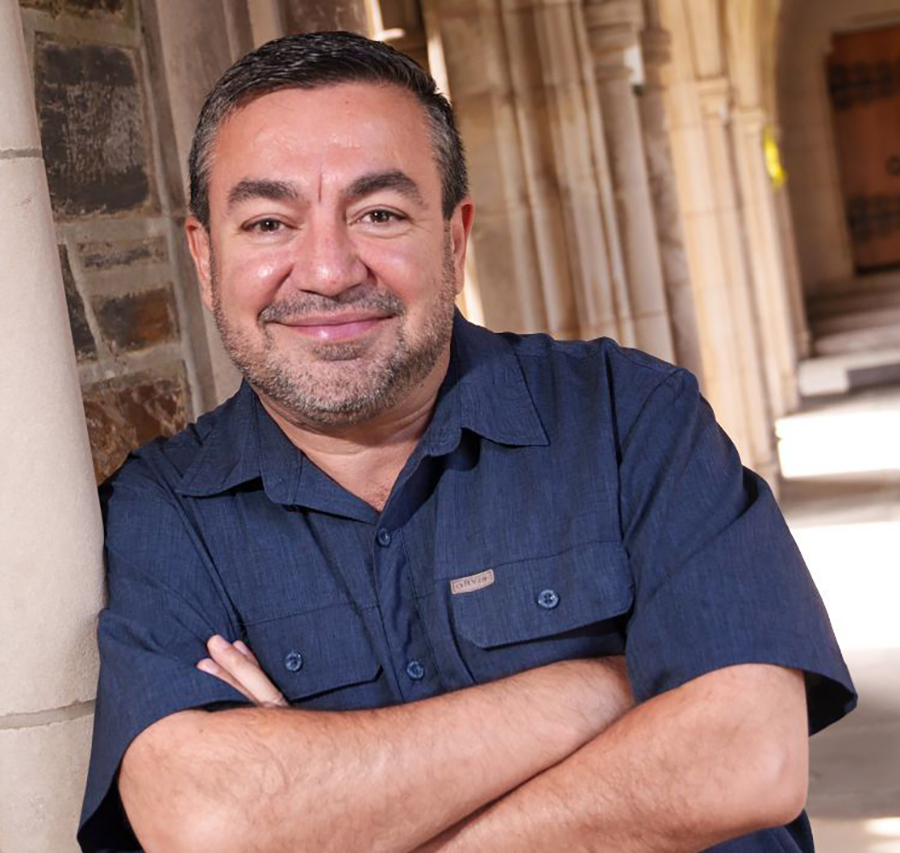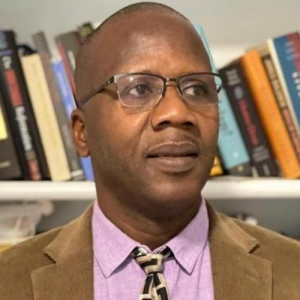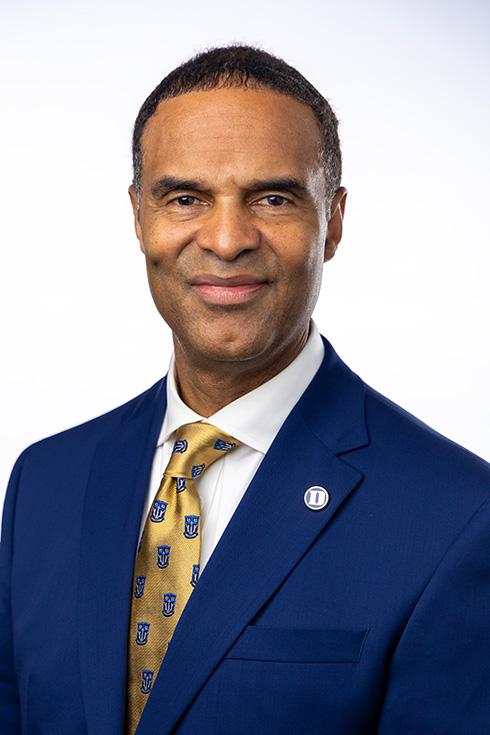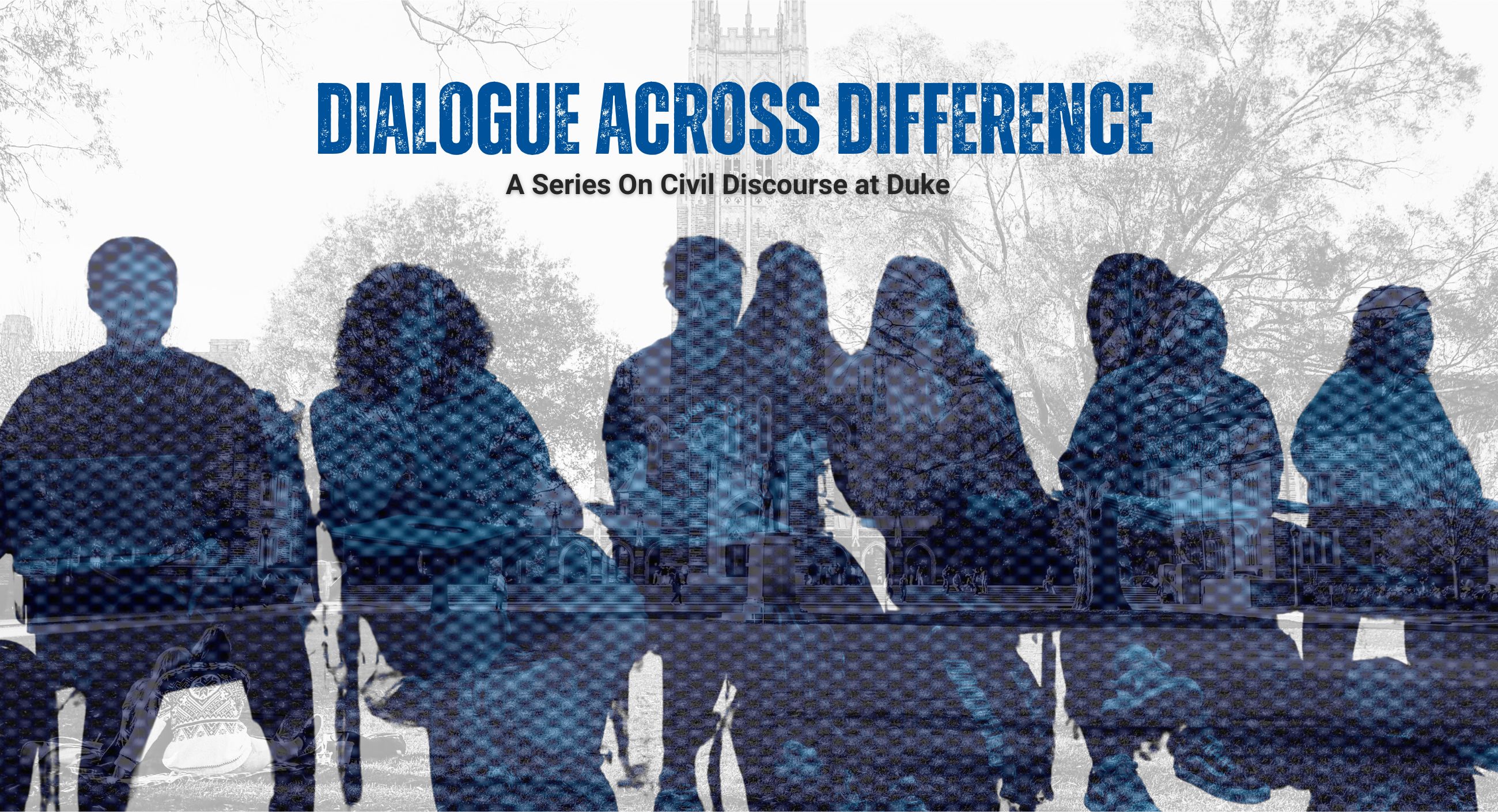Teaching Civil Discourse: ‘An Ethical, Moral Responsibility’
If the severity of polarization in the United States were tracked like terrorism, we'd be fast approaching code red, the most severe warning.
That’s according to Abdullah Antepli, new director of Duke’s Civil Discourse Project.
The project, now several years old, is part of a multi-faceted effort at Duke aimed at equipping students to respect differing viewpoints and avoid campus clashes over pressure-cooker topics such as the war in Gaza and the presidential election.
But the mission is much bigger than simply teaching students to get along, Antepli says.

“It is incredibly important, because what's at stake if this civil discourse is not minimally functioning, is our democracy, our social fabric, our social cohesion, our ability to function as a multicultural, multi-political, multi-ideological, multi-religious, multi-racial society as it's been imagined and aspired to be for some 250 years,” said Antepli, a professor of the practice at the Sanford School.
For Duke, teaching students about respecting other views “is important because the university's core ethical, moral missions to the societies that they function in.”
Societies are trusting their future to us. We have an ethical, moral responsibility that goes beyond what we do in our classroom.
Abdullah Antepli
Free Speech at Duke 'Slightly Above Average'
Duke remained largely peaceful in the months after Hamas attacked Israel on Oct. 7, 2023, which spawned violent clashes at Columbia, Harvard, UCLA and other campuses. Duke Rabbi Elana Friedman gives a lot of credit to Duke administrators for their consistent "relationship-building behind the scenes" with students and others.
"They were really thoughtful and intentional about how to react to whatever might happen," she said.
Though small, College Pulse's annual ranking of free speech on U.S. college campuses ranked Duke 27th among 251 schools, "slightly above average," based on responses from 108 undergraduates earlier this year. Harvard and Columbia were ranked 251 and 250, respectively.
27th
Where Duke stands among 251 schools in College Pulse's annual free speech ranking
The Duke respondents reported:
- For every one conservative student, there are roughly three liberal students;
- Half of the respondents said they self-censored on campus at least once or twice a month.
Sophomore Evan Brown said he's more comfortable sharing his views in his political science class because "it is largely recognized as an academic and intellectual environment open to ideas we may emotionally disagree with."
That changes in social circles, he said.
“In more social contexts, I still feel comfortable sharing most of my views but I find that I have to tread very lightly with their framing because there is no assumption of goodwill and if they hear something that resembles a mainline political argument that they disagree with, they will immediately discredit me as a misled partisan and stop listening,” said Brown, who is studying political science and economics.
Open Dialogue Diminishing
Mbaye Lo, an associate professor of the practice of Asian and Middle Eastern studies who has taught at Duke since 2006, says open dialogue overall has been diminishing at Duke as it has across the country. He calls it a “vertical” move among students -- shifting their focus to silos of viewpoints instead of moving horizontally toward embracing differing views and associations.
A few years ago, Lo also started noticing changes among students in a program he led that brought together students interested in Arabic-Islamic studies with students who were interested in Israel and Hebrew. They even started a publication together in 2009, called Juhud.
Lo calls it a “vertical” move among students --
-- shifting their focus to silos of viewpoints instead of moving horizontally toward embracing differing views and associations.

“But I could see over the years how the students, and subsequent groups of students, changed even the name of the publication three times, including the original objectives of the publication,” Lo said.
“That is just a microcosm of the noticeable rise of vertical associations among students that are based on religion, ethnic identity, or what we call primordial associations. Nothing is wrong with these types of associations, of course, they're good for nourishing a sense of belonging and fostering identity purposes.
“But we know in the literature, horizontal associations that cut across these identity limits are much better for society and are healthier for our civil discourse.”
John Rose, a visiting scholar and former instructor at the Kenan Institute who largely spearheaded the civil discourse movement at Duke, said about five years ago he and others started noticing a problem.
“Students were rather uncomfortable talking about, especially disagreeing about, contentious political issues with their peers in a classroom setting, so much so that many would not say what they actually thought,” said Rose, who will move to UNC Chapel Hill in the spring.
This concerned me and eventually led me to create a new class designed to address the problem.
John Rose
In his 2021 op-ed in The Wall Street Journal, “How I Liberated My College Classroom,” Rose said he conducted an anonymous survey of more than 100 of his students.
“Sixty-eight percent told me they self-censor on certain political topics, even around good friends. That includes self-described conservative students, but also half of the liberals,” he wrote.
Among the responses: “As a Duke student, it is difficult to be both a liberal and a Zionist,” one wrote.
Another added, “Although I support most BLM ideas, I do not feel that I can have any conversation that even slightly criticizes the movement.”
Rose added that a simple lack of humility among more vocal students is another reason some are uncomfortable sharing their views.
Setting proper expectations in the classroom has helped, he said.
“If you begin your class by saying, ‘We're going to have a real conversation,’ then nobody's surprised by it. And after all, that's the point of the class,” Rose said. “So, it doesn't come as anybody’s surprise when you get to touchy subjects and people feel uncomfortable, because they've been told you're going to feel uncomfortable.”
Senior Chloe Decker said many students do engage with divisive topics in good faith, “seeking to understand each other instead of arguing.”
“In my public policy and history classes, professors often take a moment to ask for dissenting opinions so that all perspectives can be brought to the table,” said Decker, who is majoring in public policy, minoring in history and getting a certificate in child policy research.
“As young students who regularly engage with expert faculty, I do think that Duke students can self-censor themselves because they don’t feel they have the authority or knowledge to speak on a topic. As college students living in the ‘bubble’ of Duke’s campus, at times sharing one’s opinion seems unproductive, particularly if we believe our opinion may prompt tension with peers or friends.”
Senior Chloe Decker
Expanding Civil Discourse
Antepli’s vision for promoting civil discourse includes expanding what has already served Duke well.
“I am really hoping one change will be a sense of urgency, sense of speed, and sense of we need to take this to a different level of alarm, between orange and red, if it's not almost completely red, that we should do this effectively in a larger scale and much more quickly, as much as possible,” Antepli said.
For one, he wants visiting experts to remain at Duke longer than just for a panel discussion, sort of like fellows, he said.
For the past few summers, Duke has hosted civil discourse training sessions for faculty from around the country. Antepli said he envisions continuing this outreach but perhaps breaking sessions into regional events, so faculty from the Northeast can focus on issues they deal with that may differ from academics in the West, for example. Duke Provost Alec Gallimore has been at the forefront of promoting tolerance of viewpoints on campus. In 2023-24, his first school year at Duke, he launched the ongoing Provost’s Initiative on the Middle East speaker series, which brings a diverse mix of experts and practitioners who share their perspectives.
Gallimore also created a “Free Inquiry, Pluralism, and Belonging” initiative this September to “cultivate a wide range of viewpoints and a deep desire to learn from one another’s perspectives rather than simply reiterating one’s own and automatically rejecting other views before understanding them.”
That initiative included a Provost’s Forum on how to discuss the Middle East war and the formation of the faculty-led Committee of Academic Freedom and Responsibility, Free Expression, and Engagement.
“As many of you told me, communications about these conflicts can be fraught,” Gallimore said when announcing the speaker series. “But as members of a pluralistic community who strive to practice civil discourse, we shouldn’t shy away from conversations just because they’re difficult.”
As members of a pluralistic community who strive to practice civil discourse, we shouldn’t shy away from conversations just because they’re difficult.
Alec Gallimore

